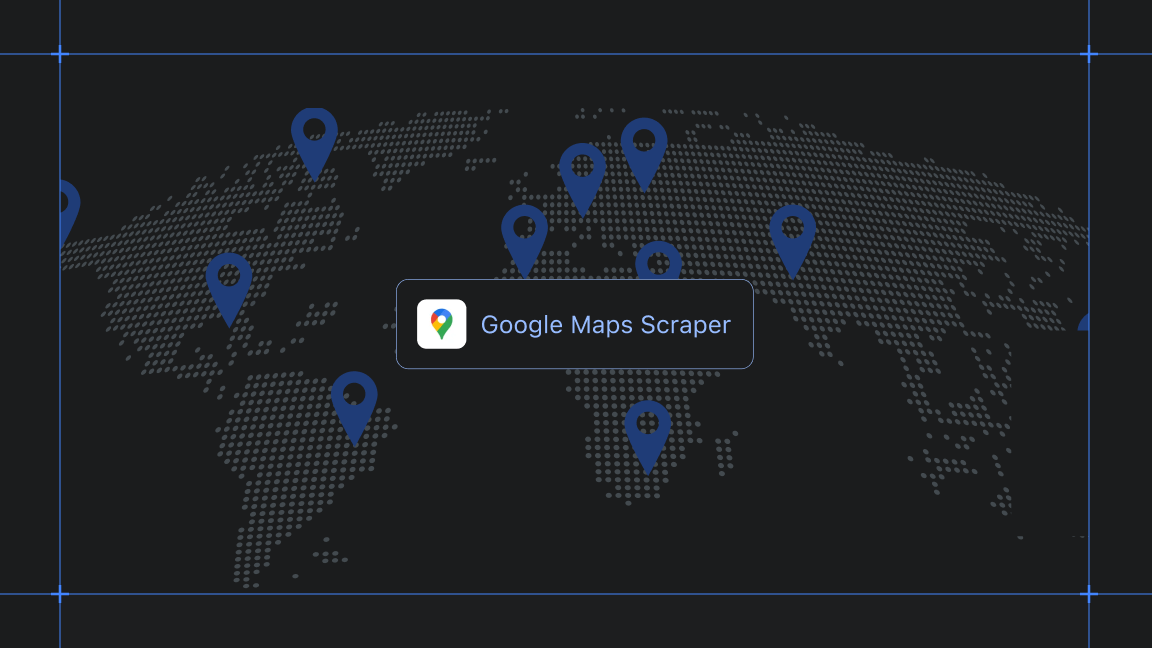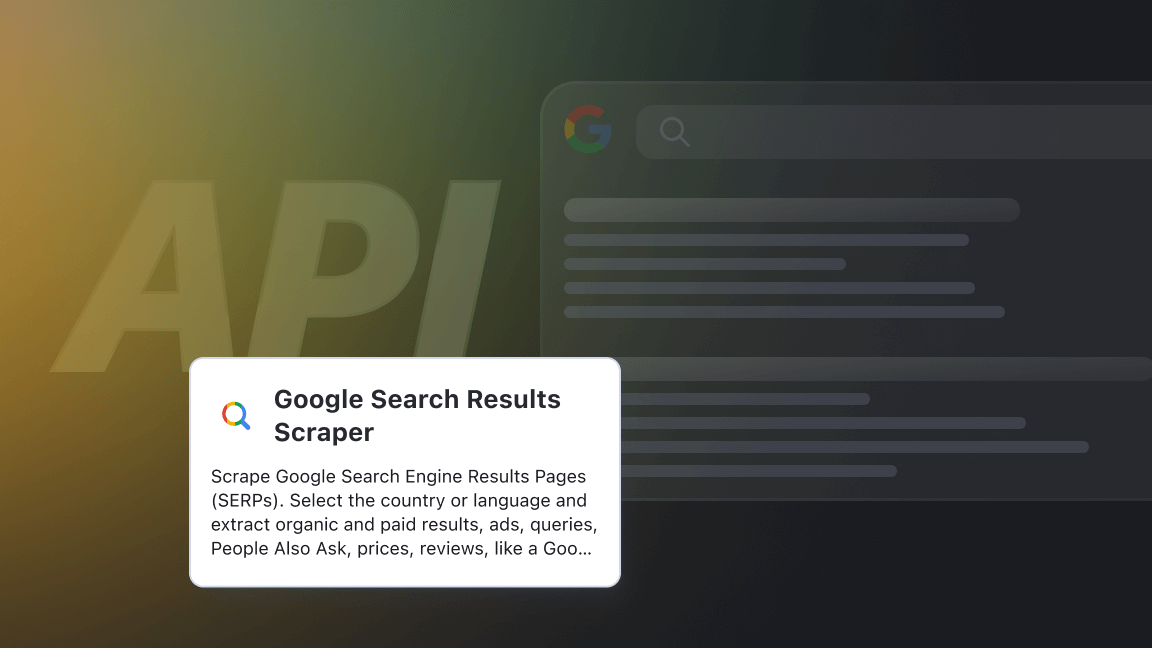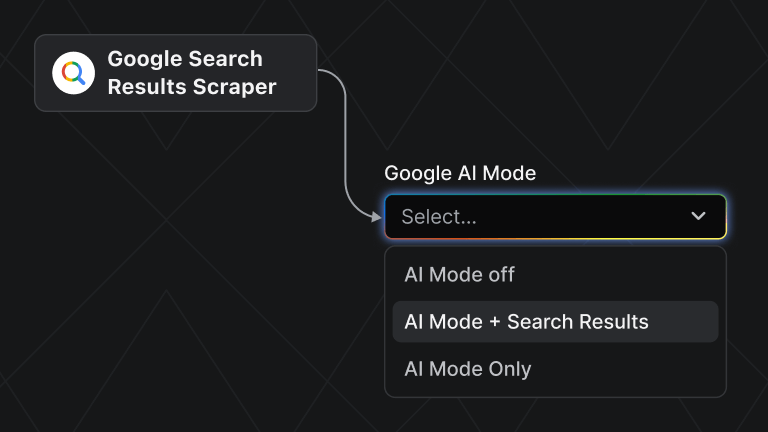SerpAPI is a solid tool for developers who need fast SERP data and don’t want to manage proxies, headless browsers, or scrapers themselves. But for all its strengths, you might have run into limitations:
- On most SerpAPI plans, you can only use 20% of your monthly quota per hour.
- Unused queries don't roll over, which can lead to high costs at scale.
- SerpAPI doesn’t include scheduling, enrichment, or task chaining — those must be built separately.
- There's no way to customize what or how things are scraped.
What to look for in a SerpAPI alternative
A strong SerpAPI replacement should offer at least some of the following:
- Flexible or usage-based pricing.
- No artificial hourly quota caps.
- Support for newer SERP types (e.g. SGE / AI-generated answers).
- Built-in ways to enrich, export, or schedule data.
- Ability to integrate into broader workflows (webhooks, queues, cloud storage, etc).
Based on these criteria, we present you with the best alternatives to SerpAPI.
The best SerpAPI alternatives
1. Apify – Google Search Results Scraper
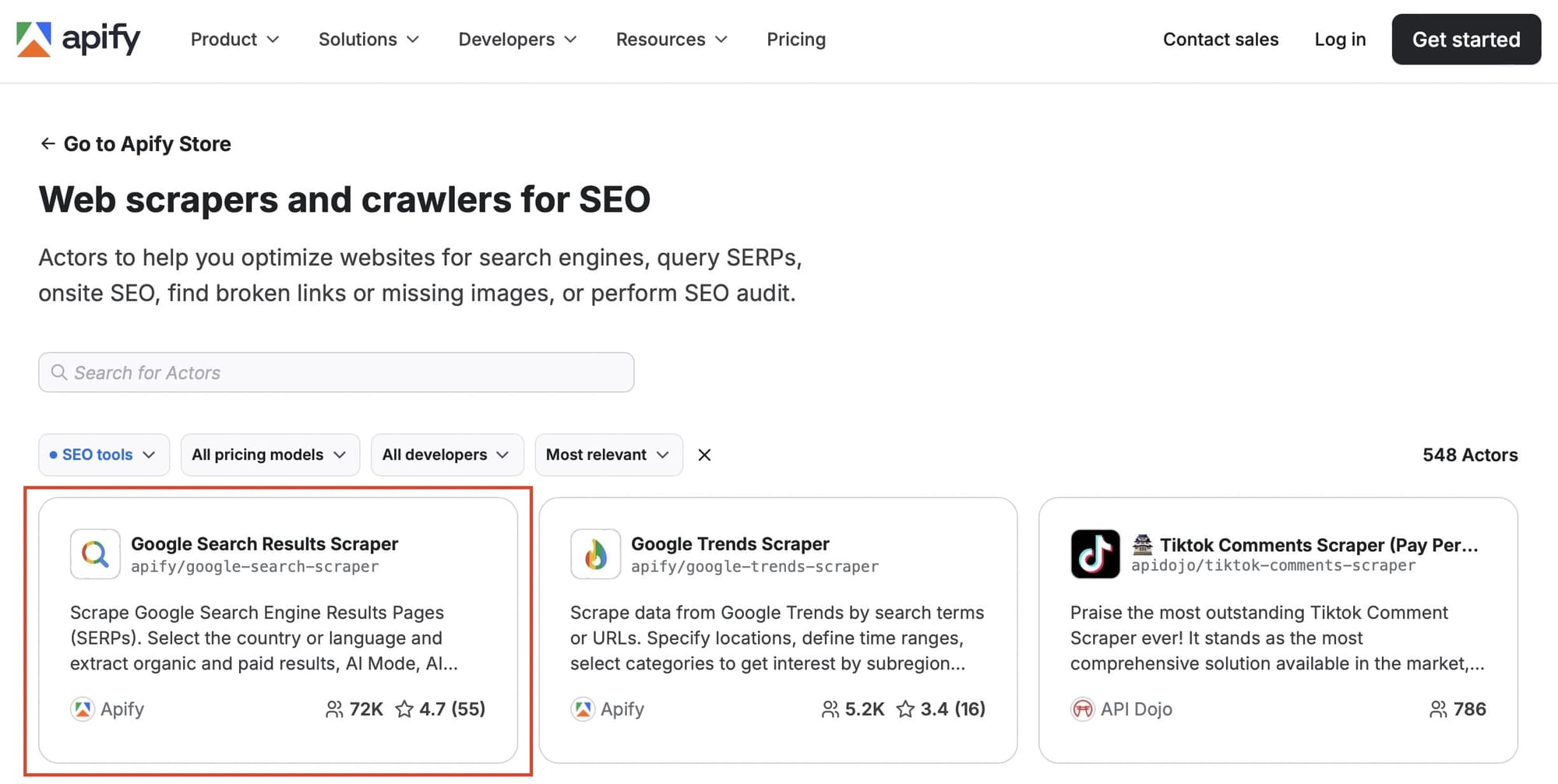
Instead of being just a SERP API, Google Search Results Scraper is part of a broader platform. You get the scraper + automation, scheduling, chaining, and optional add-ons for AI Mode, paid ads, and business lead enrichment — all natively.
Advantages
- You only pay when you actually extract results; no fixed quota blocks. It costs $4.50 to scrape 1,000 search results on a free plan ($2.45 on a business plan).
- The forever-free plan gives you $5 in monthly credit (1,000+ search results) and access to unlimited proxy usage.
- Extraction of AI Mode for generative search features.
- Paid ads results extraction add-on to determine if paid advertisements are present.
- Business lead enrichment option for contact data (name, email, job title, LinkedIn).
- Flexible export and integration — JSON, CSV, Excel, HTML exports; API / SDK support via Apify.
- No hourly usage caps - the only limit is the compute consumption you get with your plan, which you can extend with pay-as-you-go or by subscribing to a higher plan.
Limitations/trade-offs
- Enrichment, paid ad, and AI Mode features are only available to those on a paid plan (from $39/month).
- Requires some familiarity with the Apify platform for full orchestration features.
2. Bright Data – Google Search API
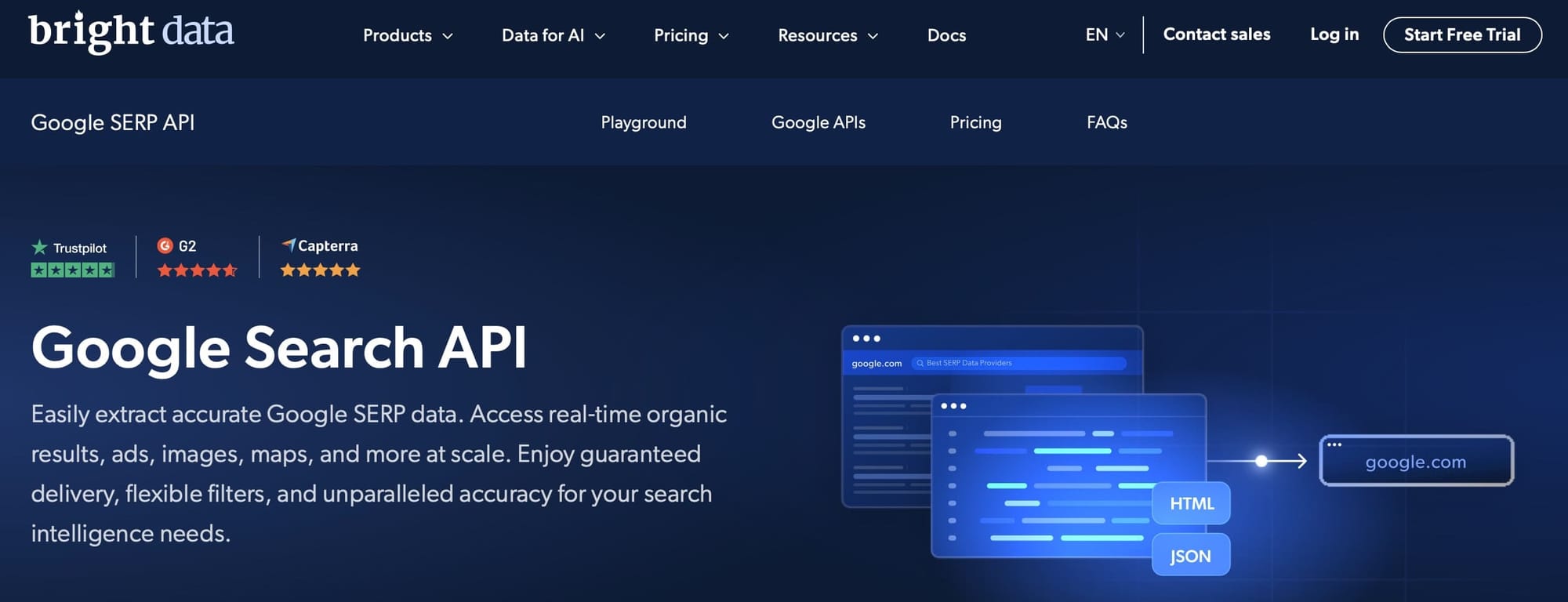
Bright Data offers deep infrastructure, proxy management, and parsing flexibility, ideal when SerpAPI’s caps or rigidity become a bottleneck.
Advantages
- Only pay for successful requests (failed ones are not charged).
- Supports 195+ countries, plus device and header customization.
- Automatic retries, IP rotation, and CAPTCHA-solving are built in.
- JSON or HTML output options; parsed JSON schema documented.
- Unlimited concurrency (no fixed concurrency cap in many plans) and broad request throughput.
Limitations/trade-offs
- Doesn’t natively provide enriched contact data or business-level metadata — you’ll still need to layer that.
- Complexity and configuration overhead may be steep for small or fast-moving teams.
3. Oxylabs – SERP Scraper API
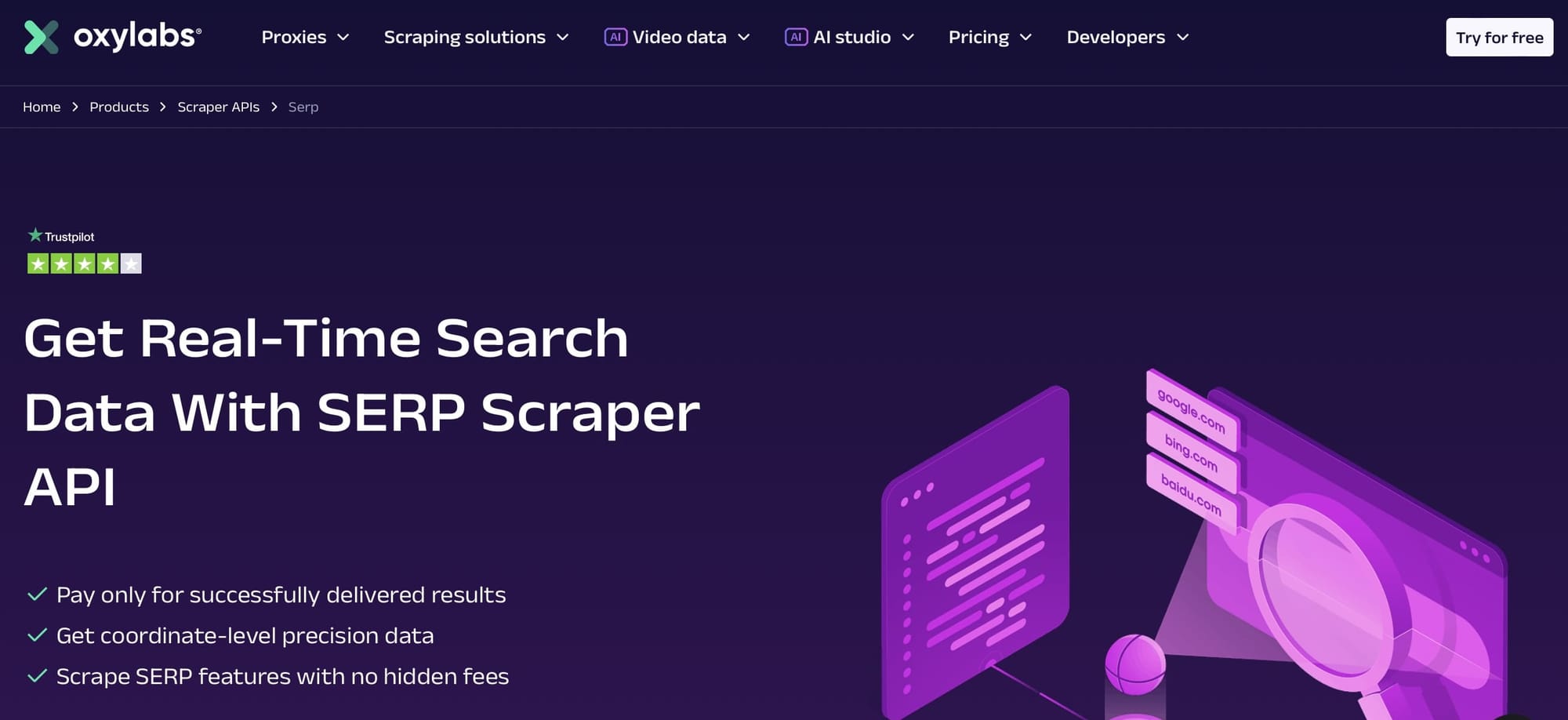
Oxylabs is built for high volume and supports multiple SERP verticals, which can help teams that need to exceed SerpAPI’s throughput limits.
Advantages
- Batch support: up to 5,000 URLs.
- JavaScript rendering and continuous scroll.
- JSON output across all major Google verticals.
Limitations/trade-offs
- High minimum pricing and complex setup for small projects.
- Requires separate logic for retry, failover, or enrichment.
4. DataForSEO – SERP API
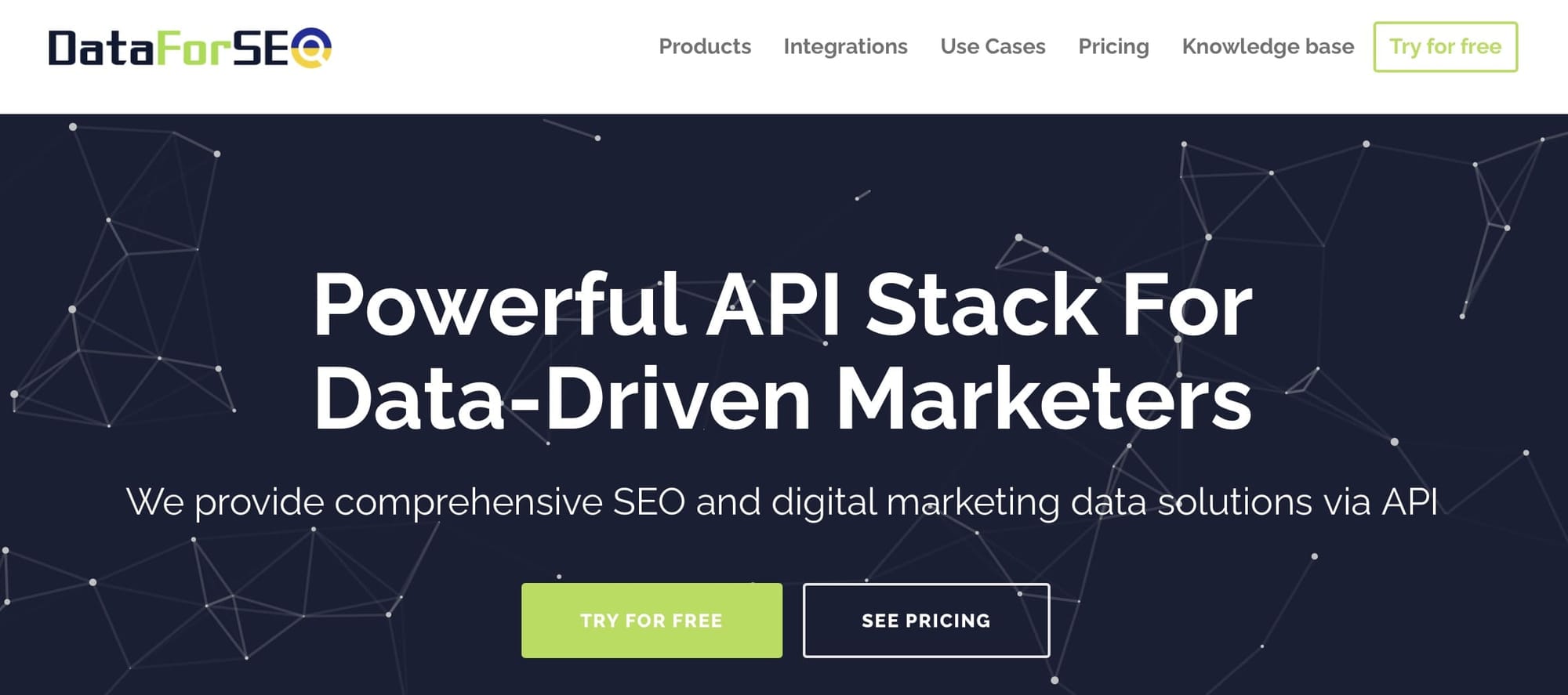
DataForSEO is flexible and scalable for SEO tooling, without enforcing monthly quotas. It offers deep control and extensions like AI summaries and screenshots.
Advantages
- No monthly quota restrictions — only API rate limits (2,000 API calls/minute).
- Pay-as-you-go / top-up balance model — funds remain until used.
- Coverage of SERP metadata and AI Mode support.
Limitations/trade-offs
- Complex task system may feel heavier than direct REST APIs.
- Some features (like screenshots) cost extra.
5. Scale Serp API
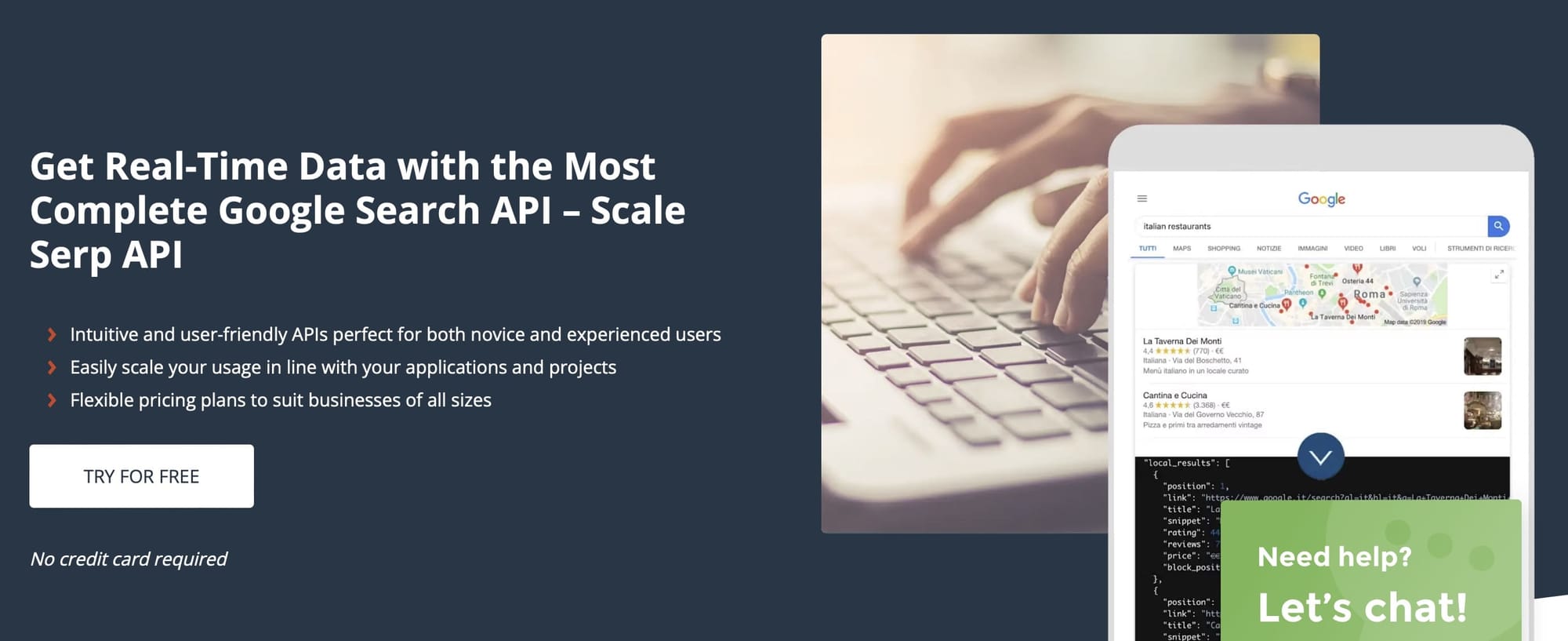
Scale SERP is simpler and more transparent, with predictable pricing and fewer obstructions, making it a good mid‑tier alternative when SerpAPI starts to feel rigid.
Advantages
- Transparent tiered pricing.
- Batch scheduling and free trial.
- Fast response and basic filters for geo, device, and language.
Limitations/trade-offs
- No AI results or enrichment features.
- Not optimized for high concurrency at a very large scale.
6. Serper
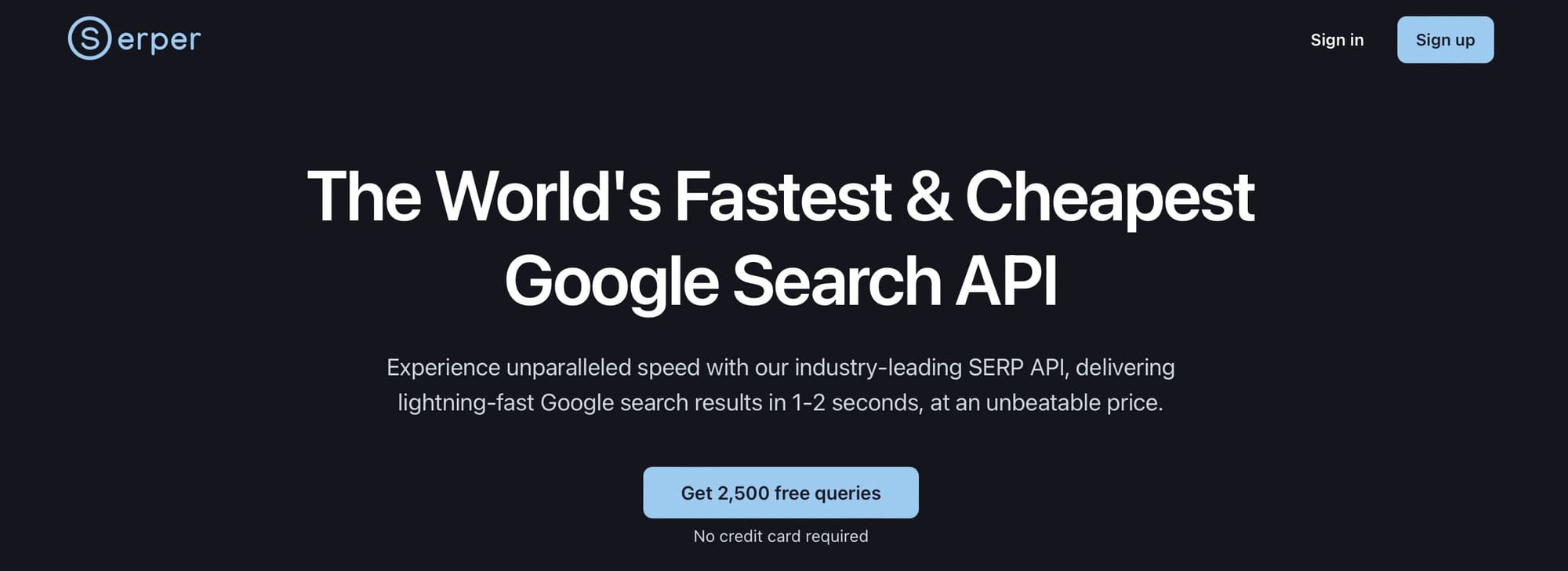
Serper is optimized for low cost, with fast response and a generous free tier. Good for prototyping or moderate volume use where SerpAPI’s tiering is too heavy.
Advantages
- From $0.30 per 1,000 queries.
- 2,500 free queries per month.
- 1–2 second average response times.
Limitations/trade-offs
- Fewer SERP verticals than others.
- Credit-based pricing can be harder to forecast.
7. Zenserp
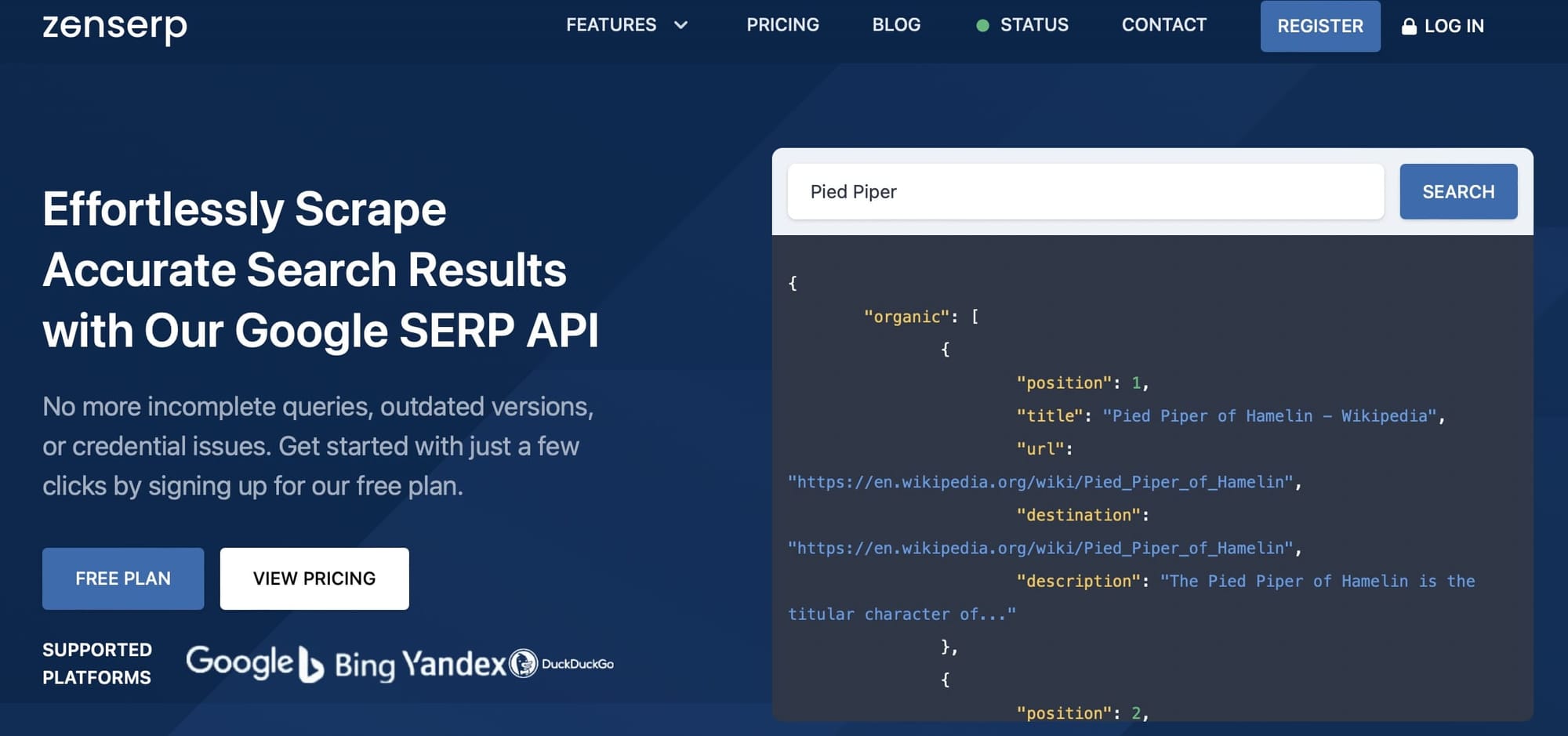
Zenserp is a hybrid — you get both SERP JSON and keyword metrics (volume, CPC) in the same API call, reducing your need for a separate keyword API.
Advantages
- Combines SERP scraping with keyword metrics.
- JSON responses include CPC, competition, and search intent.
Limitations/trade-offs
- Pricing is not as transparent as some others.
- No workflow or export tools.
8. Zenrows
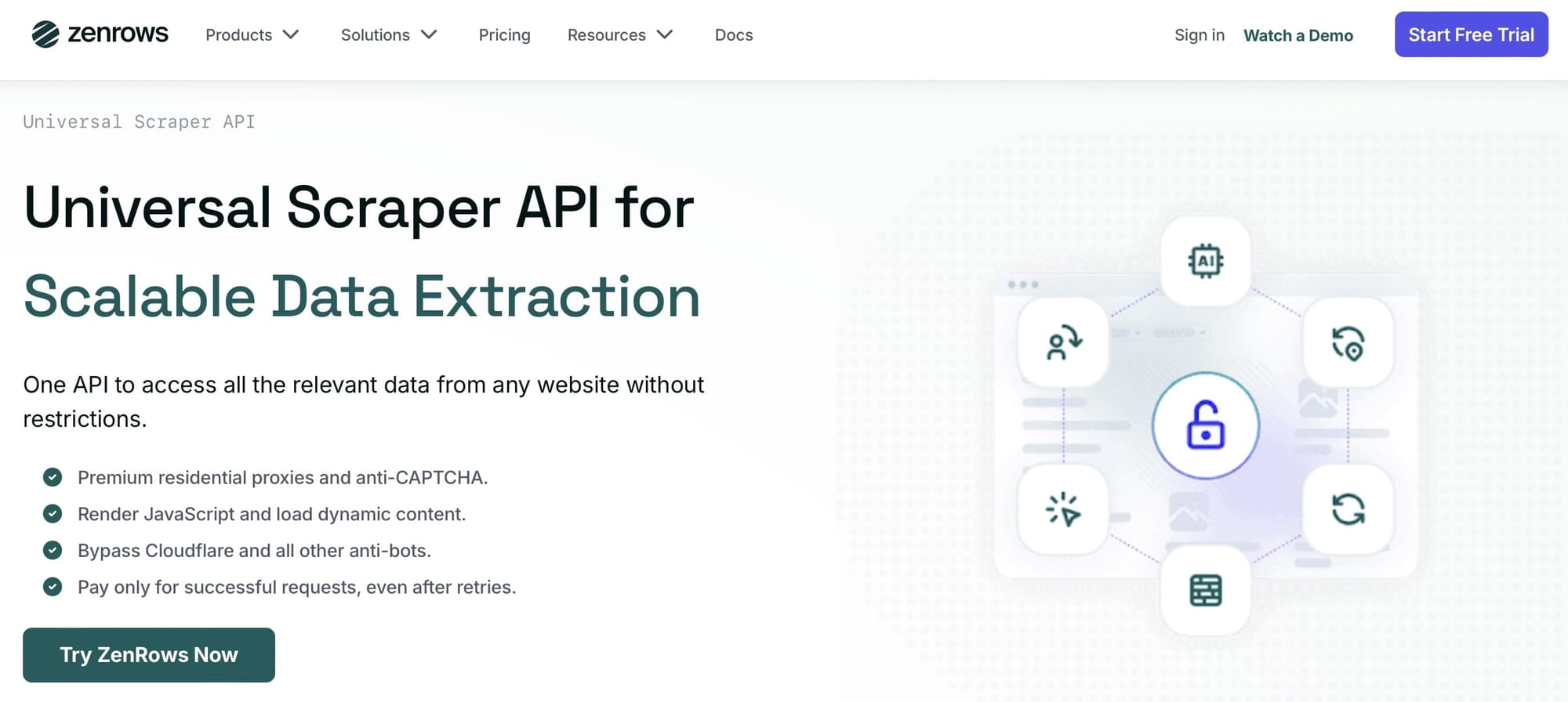
Zenrows aims at developers who prefer plug-and-play scraping with stealth and minimal configuration, removing much of the friction in setting up proxies or handling blocking.
Advantages
- Rotating proxies and bot detection included.
- SDKs for JS and Python.
- Supports JS-rendered pages.
Limitations/trade-offs
- Less specialization in SERP features.
- Not as mature in scale or vertical coverage compared to more focused SERP APIs.
9. ScraperAPI
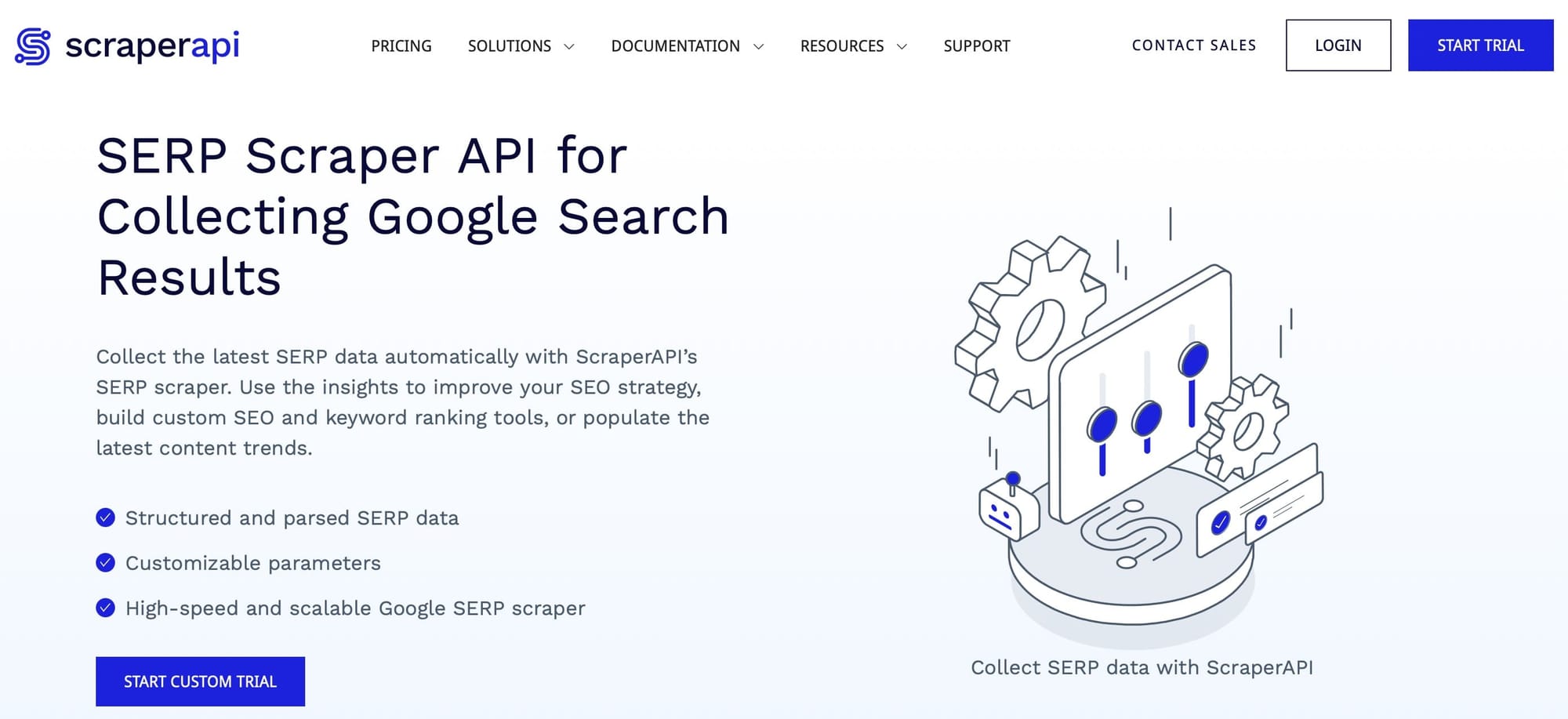
ScraperAPI is general-purpose but includes a SERP mode. If you already use it for other sites, it gives you a unified interface.
Advantages
- Use the same account/credits for SERP + non-SERP scraping.
- Rotating proxies, geo-targeting, JS rendering.
Limitations/trade-offs
- Not SERP-specific — limited control over vertical-specific data.
- No enrichment or export layer.
10. ScrapingBee
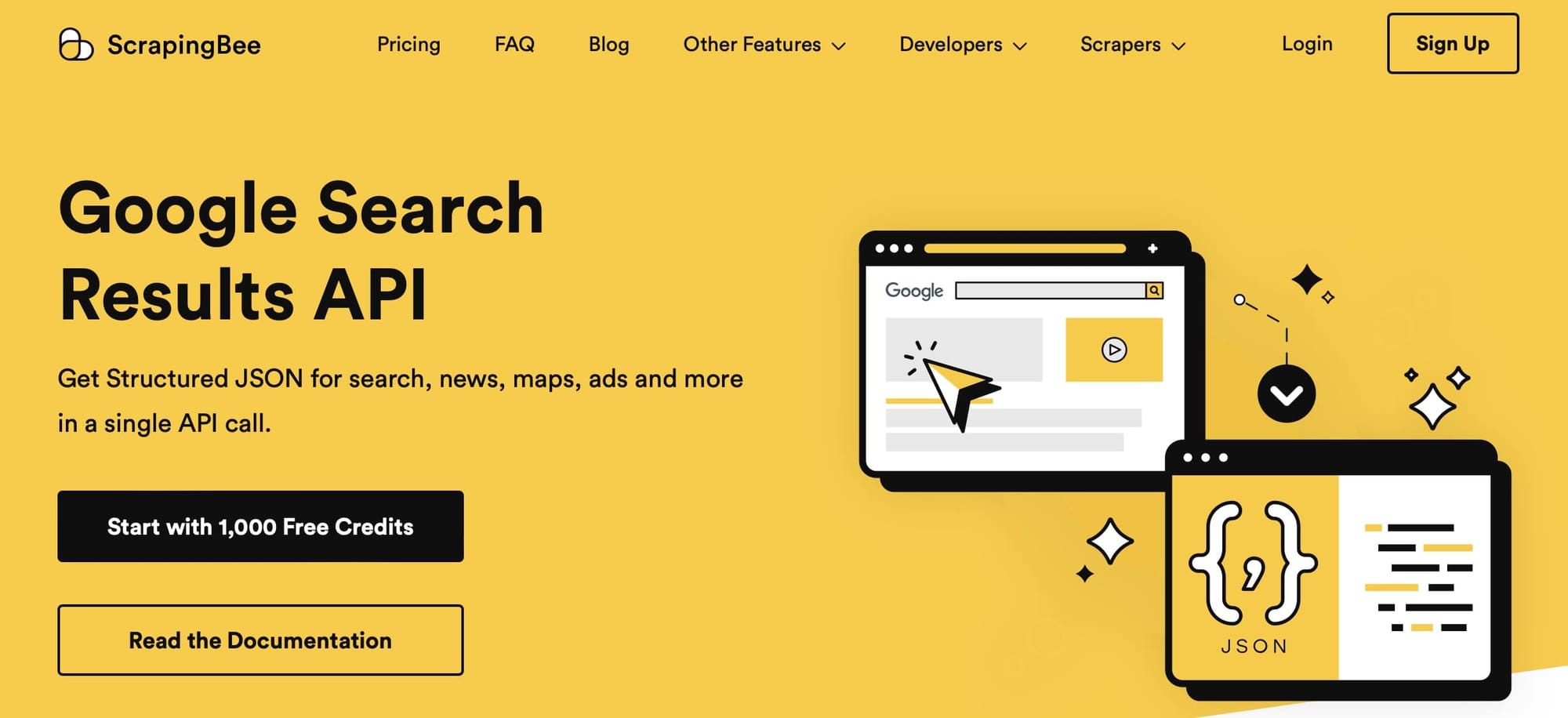
ScrapingBee offers structured SERP extraction with its credit-based API, useful when you combine search scraping and page-level scraping.
Advantages
- Use the same API to scrape SERPs and the general web.
- Transparent pricing.
Limitations/trade-offs
- Credit costs vary by SERP type and render method.
- SERP support may lag behind purpose-built APIs.
Choose the best SerpAPI alternative based on your use case
| Use case | Strongest SerpAPI alternatives |
|---|---|
| Need orchestration + enrichment | Apify |
| Avoid quotas, want pay-per-request | Apify, DataForSEO |
| Maximize control over requests & proxies | Bright Data, Oxylabs |
| Combine SERP + keyword metrics in one API | Zenserp |
| Budget / mid-volume use | Serper, Scale SERP |
| One API for SERP + web scraping | ScraperAPI, ScrapingBee |
Conclusion
In light of SerpAPI’s built-in throughput cap (20% of monthly quota per hour on smaller plans) and limited native pipeline features, Apify’s Google Search Results Scraper stands out as a more versatile option. Apify’s model lets you pay per event, avoiding rigid quota blocks, and it supports enriching scraped data with business contact information as an add-on.
Because the scraper is built on a platform that natively enables scheduling, chaining, and integrated exports (JSON, CSV, Excel, HTML), you can move from raw SERP extraction to actionable downstream workflows without stitching together separate systems.
For teams that want both reliable Google SERP JSON and the ability to build data pipelines (e.g. lead enrichment, SEO dashboards, competitive analysis), Apify offers a more complete, practical foundation — and one you can test risk-free with its $5 free usage credit.
Note: This evaluation is based on our understanding of information available to us as of October 2025. Readers should conduct their own research for detailed comparisons. Product names, logos, and brands are used for identification only and remain the property of their respective owners. Their use does not imply affiliation or endorsement.



